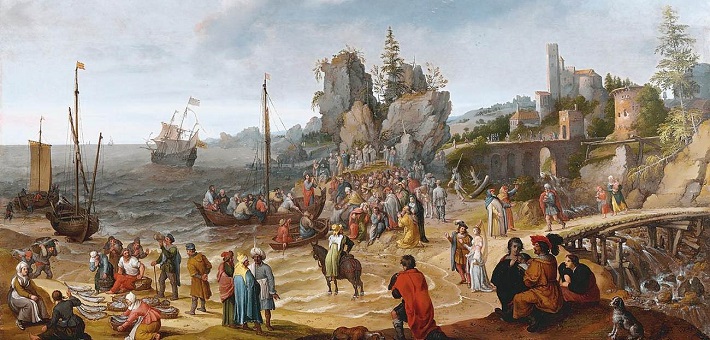Commentary on Jeremiah 23:1-6
First of all, no, it is not Good Shepherd Sunday in the lectionary cycle. But you might be forgiven for thinking so, given the texts for this week. The 23rd Psalm begins with its familiar metaphor, “The LORD is my shepherd.” And Jesus has compassion on the crowds who come to see him because they are “like sheep without a shepherd” (Mark 6:34). And God, through the prophet Jeremiah, pronounces judgment on “the shepherds who destroy and scatter the sheep of my pasture” (Jeremiah 23:1).
It is not Good Shepherd Sunday, but the metaphor of the shepherd nevertheless informs several of our texts for this week.
“Shepherd,” of course, was a common metaphor for “king” both in Israel and in other ancient Near Eastern lands. In this passage, the word undoubtedly refers to the kings of Judah, but the judgment also encompasses Judah’s other leaders. Both prophets and priests are mentioned, for instance, in the following oracle (Jeremiah 23:11).
What have these shepherds done to deserve divine judgment? They have scattered the flock. They have not “attended” to their flock, so the Lord will instead “attend” to the shepherds. And, yes, you are right to hear an ominous tone in the latter use of that word.
The details of the shepherds’ sins here are scarce but the previous chapter provides some context. “Thus says the LORD: Act with justice [mishpat] and righteousness [tsedakah], and deliver from the hand of the oppressor anyone who has been robbed. And do no wrong or violence to the alien, the orphan, and the widow, or shed innocent blood in this place” (Jeremiah 22:3).
And later, to the sons of King Josiah, “Are you a king because you compete in cedar? Did not your father eat and drink and do justice [mishpat] and righteousness [tsedakah]? Then it was well with him. He judged the cause of the poor and needy. … But your eyes and heart are only on your dishonest gain, for shedding innocent blood, and for practicing oppression and violence” (Jeremiah 22:15–17).
Oppression, violence, the shedding of innocent blood, neglecting to take up the cause of the widow, the orphan, and the foreigner—these are the sins of the kings of Judah, along with idolatry (22:8–9).
The consequences of bad leadership are devastating. The shepherds sin and the flock is scattered.
The consequences of bad leadership are devastating in every age and place. We know that today as well. We see it every day on the news. To take just one example, the brutal attack by Hamas on Israel resulted in the deaths of well over a thousand Israelis, and many hostages are still being held in Gaza. And the ensuing nihilistic conflict between Hamas and the Israeli government has ushered in nothing but death and destruction for tens of thousands of people in Gaza and no assurance of lasting security for Israel. Meanwhile, in Europe, the ego of one man, Vladimir Putin, has resulted in the deaths of well over 100,000 Ukrainians and Russians and the devastation of Ukraine’s infrastructure.
Bad leadership destroys lives and community. And bad leadership is not confined simply to outright violence. Corruption, deceit, self-centeredness, laziness—such venal qualities in a leader, whether king, prime minister, or president, make the lives of their citizens much harder and more insecure.
The good news in this passage is that God sees and judges such shepherds/leaders, and that God will gather the flock that has been scattered. The people will again be “fruitful and multiply,” an obvious reference back to the creation story in Genesis 1, where God is the one who rules, the one who creates life and causes it to flourish abundantly.
And God will raise up new shepherds for God’s people. These new leaders will actually shepherd the flock, so that they will not be afraid, “nor shall any be missing, says the LORD” (Jeremiah 23:4).
The promise continues: God will raise up a descendant of King David, that golden king of Israel. This “righteous Branch” from David’s line will reign with wisdom like the young Solomon, but unlike Solomon, his reign will ultimately be marked by justice (mishpat) and righteousness (tsedakah) in the land (23:5). Christians rightly hear in this promise resonance with the life of Jesus the Christ, but the promise also tells us something about temporal rulers.
The virtues of justice (mishpat) and righteousness (tsedakah) are a recurring theme in these chapters of Jeremiah. They are the qualities of a good king. A ruler who practices mishpat will ensure that justice is done, that the rich will not oppress the poor and the powerful will be held accountable for their deeds. The word mishpat can also be translated “judgment.” Judgment is sometimes necessary in order for justice to be done. That God will judge the bad shepherds is good news for those whom they oppress.
Rulers who practice tzedakah are upright and virtuous. They refrain from doing evil and they obey God’s commandments, including the commandment to care for the poor and vulnerable, the widow, the orphan, and the foreigner. The rulers who practice tzedakah have no blood on their hands. They obey God and they serve their people. Such a leader, such a shepherd will be called by the name “The LORD is our righteousness” (23:6).
These virtues, of course, continue to be important for leaders today, whether kings and queens, prime ministers, or presidents.
As we in the United States enter into a contentious election season, we pray for leaders of integrity to be chosen, shepherds who serve their people, who practice justice (mishpat) and righteousness (tsedakah). And we pray for such leaders in nations around the world, shepherds who will usher in God’s shalom, so that their people “shall not fear any longer, or be dismayed, nor shall any be missing.” May it be so for us and for our global neighbors.


July 21, 2024